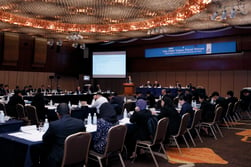News from Asia and the Pacific
IMF Promotes an Assessment Tool for Better Infrastructure Governance at an Int’l Forum
 November 21, 2019, Tokyo, Japan – Infrastructure investment has been often inefficient but the efficiency gap can be closed, said yesterday IMF’s Deputy Managing Director Mitsuhiro Furusawa at an international forum on fiscal policies where representatives from about 20 Asian countries got together to discuss infrastructure governance and demographics issues.
November 21, 2019, Tokyo, Japan – Infrastructure investment has been often inefficient but the efficiency gap can be closed, said yesterday IMF’s Deputy Managing Director Mitsuhiro Furusawa at an international forum on fiscal policies where representatives from about 20 Asian countries got together to discuss infrastructure governance and demographics issues.
Furusawa made a key note speech at the fifth Tokyo Fiscal Forum, setting out the focus of discussions on quality infrastructure investment. The forum was co-organized by the IMF, the Ministry of Finance and the Asian Development Bank Institute as a G20 event under the Japanese presidency.
“Our analysis shows that infrastructure spending is often very inefficient. On average, countries lose about 30 % of potential returns on their infrastructure investments,” said Furusawa, explaining that it means only 7 km of roads get built with the resources for the construction of 10-km roads.
“Countries can expect significant benefits – more and better roads, schools and hospitals – if they focus on improving the quality of public investment spending,” he said, adding that if countries enhance their infrastructure governance, such as planning, allocating and implementing infrastructure investment, “two-thirds of the efficiency gap can be closed.”
Furusawa then said that the IMF’s assessment tool called Public Investment Management Assessment, or PIMA, can assist countries to close the gap as it helps assess infrastructure governance, identifying strengths and weaknesses and proposing action plans for reform. The IMF has completed the assessment in 58 countries around the world, including 12 Asian countries.
 During the forum, several countries, including Indonesia and the Maldives, shared their experience in designing specific reform plans based on PIMA recommendations.
During the forum, several countries, including Indonesia and the Maldives, shared their experience in designing specific reform plans based on PIMA recommendations.
Participants also discussed other infrastructure issues such as environmental and social considerations and reviewed the institutional framework to build more resilient infrastructure in Asia to respond to natural disasters and climate change.
About 70 senior government officials from Asia participated in the two-day forum, focusing on two of the G20 priorities – quality infrastructure investment and population aging.
On the second day, the participants focused on aging and its policy implications, and discussed the multi-faceted nature of aging’s macroeconomic impact. Many agreed on the importance of institutional reforms to adapt to longevity, including raising the retirement age and improving social security systems. Those from emerging economies shared their difficulty of facing aging issues before establishing social security systems to support the elderly.
The participants actively engaged in the discussions to exchange views and practical knowledge.
Photography by Policy Research Institute (PRI), Ministry of Finance, Japan


